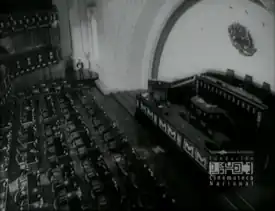Congress of the Republic of Venezuela | |
|---|---|
.svg.png.webp) | |
| Type | |
| Type | |
| Houses | Upper house: Senate of Venezuela Lower house: Venezuelan Chamber of Deputies |
| History | |
| Established | 1811 |
| Disbanded | 1999 |
| Succeeded by | National Assembly (Venezuela) |
| Meeting place | |
 | |
| Palacio Federal Legislativo, Caracas | |

The Congress of the Republic, also known as the National Congress, represented the Venezuelan Legislative Branch until 1999. It had a bicameral composition: a Chamber of Senators (or Senate) and a Chamber of Deputies. The last president of the Chamber of Senators (who, in turn, served as President of Congress) was Luis Alfonso Dávila, elected senator in the State of Anzoátegui by the Socialist-leaning party Movimiento Quinta República; the last president of the Chamber of Deputies (who also served as Vice President of Congress) was Henrique Capriles Radonski, who was elected deputy in the State of Zulia by the Christian Socialist party COPEI.
Different sectors of Venezuelan political life, both in the opposition and in government, have raised the possibility that, at some point, two chambers will again function in the Venezuelan Legislative Branch, resuming their bicameral composition. However, so far these are only proposals that have been made.[1][2]
Official names
According to the different Constitutions that Venezuela has had:
- Congreso General de Venezuela, in Constitution of 1811 and 1819 (19 years).
- Congreso del Estado de Venezuela, in Constitution of 1830, 1857 and 1858 (34 years).
- Congreso de los Estados Unidos de Venezuela, in Constitution of 1864, 1874, 1881, 1891, 1893, 1901, 1904, 1909, 1914, 1922, 1925, 1928, 1929, 1931, 1936 and 1947 (89 years).
- Congreso de la República de Venezuela, in Constitution of 1953 and 1961 (46 years).
Elections
- 1832 Venezuelan parliamentary election
- 1835 Venezuelan parliamentary election
- 1838 Venezuelan parliamentary election
- 1841 Venezuelan parliamentary election
- 1844 Venezuelan parliamentary election
- 1847 Venezuelan parliamentary election
- 1850 Venezuelan parliamentary election
- 1853 Venezuelan parliamentary election
- 1856 Venezuelan parliamentary election
- 1859 Venezuelan parliamentary election
- 1863 Venezuelan parliamentary election
- 1873 Venezuelan parliamentary election
- 1877 Venezuelan parliamentary election
- 1882 Venezuelan parliamentary election
- 1888 Venezuelan parliamentary election
- 1890 Venezuelan parliamentary election
- 1894 Venezuelan parliamentary election
- 1898 Venezuelan parliamentary election
- 1922 Venezuelan parliamentary election
- 1929 Venezuelan parliamentary election
- 1931 Venezuelan general election
- 1936 Venezuelan general election
- 1941 Venezuelan parliamentary election
- 1947 Venezuelan general election
- 1958 Venezuelan general election
- 1963 Venezuelan general election
- 1968 Venezuelan general election
- 1973 Venezuelan general election
- 1978 Venezuelan general election
- 1983 Venezuelan general election
- 1988 Venezuelan general election
- 1993 Venezuelan general election
- 1998 Venezuelan parliamentary election
Representatives
| Períod | Majority | First Minority | |||||||
|---|---|---|---|---|---|---|---|---|---|
| Party | MPs | Senators | Position | Type | Party | MPs | Senators | Type | |
| 1947 - 1948 | 83 / 110 |
38 / 46 |
Government | Absolute | 16 / 110 |
4 / 46 |
Opposition | ||
| 1959 - 1964 | 73 / 132 |
32 / 51 |
Government | Absolute | 34 / 132 |
11 / 51 |
Opposition | ||
| 1964 - 1969 | 66 / 179 |
22 / 47 |
Government | Simple | 39 / 179 |
8 / 47 |
Opposition | ||
| 1969 - 1974 | 66 / 214 |
19 / 52 |
Opposition | Simple | 59 / 214 |
16 / 52 |
Government | ||
| 1974 - 1979 | 102 / 200 |
28 / 47 |
Government | Absolute | 64 / 200 |
13 / 47 |
Opposition | ||
| 1979 - 1984 | 88 / 199 |
21 / 44 |
Opposition | Simple | 84 / 199 |
21 / 44 |
Government | ||
| 1984 - 1989 | 113 / 200 |
28 / 44 |
Government | Absolute | 60 / 200 |
14 / 44 |
Opposition | ||
| 1989 - 1994 | 97 / 201 |
22 / 46 |
Government | Simple | 67 / 201 |
20 / 46 |
Opposition | ||
| 1994 - 1999 | 55 / 203 |
16 / 50 |
Opposition | Simple | 53 / 203 |
14 / 50 |
Opposition | ||
| 1999 | 61 / 206 |
21 / 54 |
Opposition | Simple | 35 / 206 |
8 / 54 |
Government | ||
See also
- Category:Members of the Chamber of Deputies (Venezuela)
- National Assembly (Venezuela)
- Senate of Venezuela
- Storming of the Venezuelan National Congress
References
- ↑ "Isaías Rodríguez planteó reanudar la figura de parlamento bicameral". Analitica.com (in Spanish). 2017-09-21. Retrieved 2020-01-31.
- ↑ "Ramos Allup: Parlamento debe volver a ser bicameral | Monitor Legislativo" (in European Spanish). Archived from the original on 2019-05-13. Retrieved 2020-01-31.